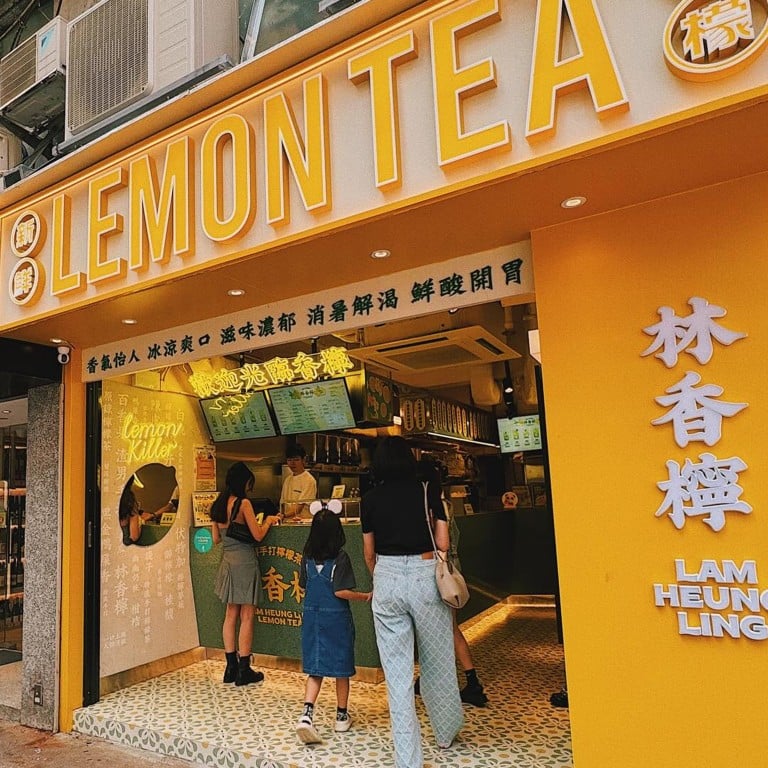
Pucker up Hongkongers: lemon-tea shops from mainland China want to wet your whistles this summer and beyond
- Mainland China-based chains including Linlee, Lam Heung Ling, Jo’s Cha, The One Lemon Tea and LMM are drawing queues in Hong Kong
- The city presents a different flavour of business challenge than the operators may be used to in the mainland China market, analysts say
First came the bubble-tea purveyors. Now, it’s lemon time.
Several mainland China-based chains that specialise in pairing fresh lemons with a variety of robust and fruity tea flavours now see the Hong Kong market as a sweet new location for their sour operations.
For example, Lam Heung Ling, a lemon-tea powerhouse from Zhanjiang in Guangdong province, has launched six stores in Hong Kong since first opening in 2023. The company uses lemons sourced from Guangxi, a city known for growing the fruit with a unique aroma and refreshing taste. Each cup is made with an entire lemon’s worth of juice.
Jo’s Cha, a brand from Guangzhou that has 500 mainland stores, launched its first Hong Kong shop in Mong Kok last year. Its signature bitter gourd lemon tea is renowned for being a “national first”. Other popular brands expanding to Hong Kong recently include Linlee, The One Lemon Tea and LMM (Ling Meng Meng).
These newcomers clearly sense a growing thirst for their zingy drinks among Hongkongers, and long queues have become common even in districts such as Causeway Bay, where multiple new shops compete for passersby. However, Hong Kong also presents a different flavour of business challenge than the operators may be used to in the mainland China market, analysts said.
The market value of China’s new-style tea drinks is likely to surpass 200 billion yuan (US$27.6 billion) in 2025, up a third from an estimated 150 billion yuan in 2023, according to a joint report by the China Chain Store and Franchise Association and e-commerce platform Meituan last year.

“We believe that the demand for takeaway beverages will increase in the coming months as summer is coming,” said Andy Kong, the senior district sales and strategic director of Midland Shops, a part of property consultant Midland IC&I.
Surviving in Hong Kong over the longer term may be a juicier test, though not an impossible one, as long-tenured Chinese brands such as Heytea and Nayuki have proved.
“The costs of rent, utilities and labour in Hong Kong are generally high, which is a significant challenge for brands accustomed to the low-cost operations of the mainland,” said Nicole Sun, M&A advisory partner with PwC China.
To maintain competitiveness, mainland brands need to reduce costs as much as possible while ensuring product quality and service level, she said.
“On average the current market monthly rent of a beverage shop is around HK$100,000 [US$12,800], and the selling price of a cup in these beverage shops is around HK$20 to HK$30 on average,” added Parco Tsang, research analyst at Midland IC&I Research.
This means that such shops have to sell around 3,300 to 5,000 cups per month just to cover their rent.
However, this is a reasonable target because rent is the main expense these businesses face, given that only two or three employees are needed to operate a shop, Tsang and Kong said.
Setting up in popular areas is important for visibility, branding and customer convenience, even if the relatively higher rents cut into profit margins, said Oliver Tong, head of retail at JLL in Hong Kong.
“Franchise owners are looking at their portfolio as a whole,” Tong said. “Say for example they have 10 shops in Hong Kong. [The owner] is looking for the profitability of those 10 shops as a whole and not that of one single shop.”
PwC’s Sun is upbeat about the lemon-tea trend persisting in Hong Kong. The city has strong cultural ties with tea, and the offerings of the modern tea brands align well with local consumers’ expectations for high quality and a pleasant customer experience, she said.
Plus, high street rents at the end of the first quarter were close to levels last seen in 2004 and 70 per cent below the historical peak in the third quarter of 2014, according to data from JLL.
Rents also remain 40 per cent below the level seen in the last quarter of 2019, before the Covid-19 pandemic.
Meanwhile, continuous improvements in the cross-border supply chain have facilitated the development of mainland brands in Hong Kong, Sun said.
“By optimising key links such as logistics, distribution and warehouse management, mainland brands can better control costs while ensuring the quality and freshness of the products,” she said.
New entrants can sustain their growth by being adaptable to the higher demands of consumers, Midland’s Kong said. For example, they can change up their menus to meet new trends and offer lots of flexible options to keep customers coming back.


